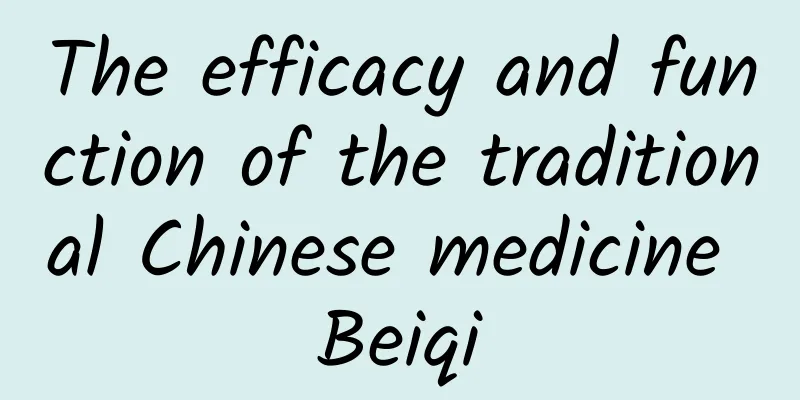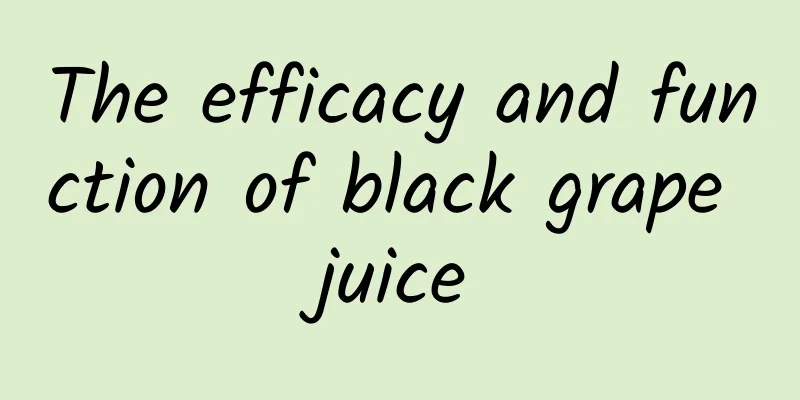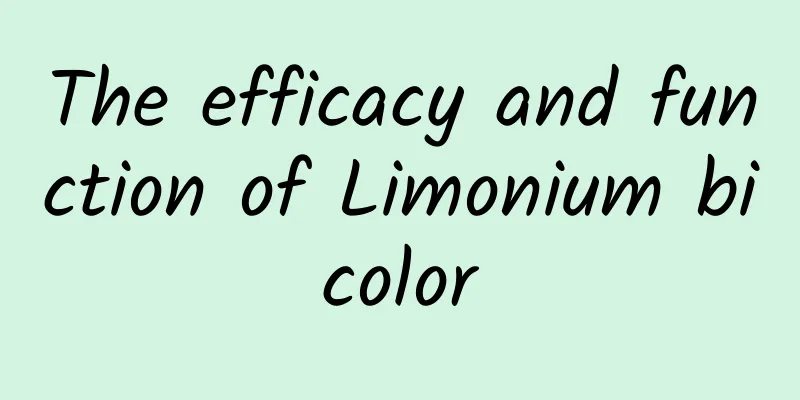The efficacy and function of the traditional Chinese medicine Beiqi

|
The Chinese medicine Beiqi often appears in some traditional Chinese medicine prescriptions. Beiqi is actually what people often call Astragalus membranaceus. It mainly grows in the north. Many people use Beiqi to soak in water, which is said to replenish qi. People don't know much about the effects and functions of the traditional Chinese medicine Beiqi, they just simply know that it has the effect of replenishing qi and blood. In fact, Beiqi has many other functions. It can treat spleen and stomach weakness, spontaneous sweating due to deficiency of the exterior, and qi deficiency and sinking. 1. Efficacy Beiqi is also known as Huangqi and Mianqi. People in the south often call this medicine "Beiqi" because Huangqi is produced in the north. The best medicinal materials are those with thick and long roots, cottony texture, floury texture when broken, yellowish-white in color, and sweet in taste. Beiqi is sweet in taste, slightly warm in nature, and enters the spleen and lung meridians. It has a strong qi-replenishing effect and is a commonly used product for replenishing qi and blood. In addition to its qi-replenishing effect, Beiqi has other functions. Due to its wide range of uses, it is known as "a medicine with multiple functions." Its application scope involves internal medicine, surgery, gynecology, pediatrics, ENT, and orthopedics, and it has the following five major effects 1. Nourish the spleen and replenish qi It is used for symptoms such as weak spleen and stomach, poor appetite, loose stools, fatigue, diarrhea due to spleen deficiency, and prolapse of the anus due to long-term diarrhea. Beiqi has a strong effect of replenishing qi and is good at replenishing lung qi. It can treat symptoms such as shortness of breath due to lung deficiency, low voice, laziness, fatigue, and susceptibility to colds. It is often used together with Codonopsis pilosula, Atractylodes macrocephala, Chinese yam, and roasted licorice. Beiqi processed with honey has stronger tonic effect. 2. Strengthen the exterior and stop sweating Used for spontaneous sweating due to deficiency of exterior. Beiqi can replenish Qi while also having the property of tonifying the exterior, so it can replenish Qi and strengthen the exterior to stop sweating. Beiqi has a good effect in strengthening the exterior and stopping sweating. Clinically, through different combinations, it can treat various sweating diseases; when used with yang-boosting drugs, it can treat spontaneous sweating due to yang deficiency; when used with qi-tonifying drugs, it can treat spontaneous sweating due to qi deficiency; when used with tonic drugs, it can treat night sweats due to yin deficiency. If Qi and blood are insufficient and one is exposed to wind and cold, one often cannot sweat. Adding Astragalus to antipyretic drugs can stimulate Yang Qi, replenish the source of sweat, and induce sweating. This is the reason why it is said that "Astragalus can stop sweating if there is sweat, and induce sweating if there is no sweat." It is best to use it raw at this time. 3. Replenishing Qi and raising Yang Used for symptoms of qi deficiency and sinking. Traditional Chinese medicine believes that the prolapse of internal organs is due to the sinking of Qi in the middle. Beiqi is good at invigorating Qi and raising Yang, and can treat rectal prolapse, uterine prolapse, gastric ptosis, kidney ptosis, and metrorrhagia caused by Qi deficiency and blood loss. Traditional Chinese medicine uses Buzhong Yiqi Decoction to treat various symptoms of organ prolapse. The Beiqi in Buzhong Yiqi Decoction is used for its Qi-replenishing and ascending properties, which can raise the clear yang of the spleen and stomach. At this time, it is best to use it after making it with honey. 4. Diuresis and swelling It is used for edema due to qi deficiency, often with Atractylodes macrocephala, Stephania tetrandra, roasted licorice or cinnamon twig and Poria cocos. For example, Fangji Huangqi Decoction and Fangji Fuling Decoction both contain this product. It is mostly used to treat proteinuria in chronic nephritis, late-stage diabetes, etc. 5. Drain pus from ulcer It is used for carbuncles caused by Qi deficiency that do not break for a long time, or do not heal for a long time after breaking. It is often used together with Codonopsis pilosula and cinnamon bark. This product can replenish qi and strengthen the spleen, promote the early rupture of pustules and muscle regeneration, and has the effect of draining pus and promoting muscle regeneration. Beiqi is an important Qi-tonifying medicine, which can replenish the Qi of the whole body. It can nourish the spleen and stomach, nourish the lungs and replenish qi, nourish qi and consolidate qi, nourish qi and reduce swelling, nourish qi and produce blood, nourish qi and dredge the meridians, nourish qi and lift, nourish qi and expel toxins, and discharge pus and regenerate muscles. The ancients praised Beiqi as "the best of all qi-replenishing medicines." In addition, traditional Chinese medicine believes that replenishing qi helps produce blood, so adding qi-replenishing herbs such as Astragalus membranaceus and Codonopsis pilosula can enhance the blood-replenishing effect when treating various blood deficiency syndromes, such as Guipi Decoction, which has the effects of strengthening the spleen and nourishing the heart, replenishing blood and invigorating qi. Beiqi also has the effect of lowering blood sugar, so it is often used in combination with yam, rehmannia, radix trichosanthis, schisandra chinensis, etc. to treat diabetes (diabetes). The use of Beiqi during radiotherapy and chemotherapy for cancer can enhance the effects of anticancer drugs, reduce the adverse reactions of radiotherapy and chemotherapy, protect normal cells, and prevent bone marrow suppression. Another famous prescription in traditional Chinese medicine is Buyang Huanwu Decoction, which uses 4 liang of Beiqi (Astragalus membranaceus) to treat hemiplegia caused by the sequelae of stroke, with very good results. |
<<: The efficacy and function of Laimahui
Recommend
Benefits of Korean Ginseng
Chinese herbal medicine is very common in our dai...
The efficacy and function of the root of the sharp-leaved tea
Traditional Chinese medicine culture is profound ...
Heroes return, just in time! How long does it take for astronauts to recover after returning home?
At 9:56 am on April 16, the return capsule of the...
Can Chinese medicine dissolve gallstones?
There are many ways to treat diseases such as gal...
Will eating crabs cause children to suffer from precocious puberty?
Do you like eating crabs? It is the season of cra...
The first giant panda to go abroad was mistaken for a strange pug
More than a hundred years ago in the Western worl...
The efficacy and role of small leaf diphtheria
As a traditional Chinese medicine, the small-leav...
What are the effects of soaking the fruit in wine?
The twisted fruit is also called myrtle, doll, pe...
Understanding Russian History in One Breath (3)
Mixed Knowledge Specially designed to cure confus...
Side effects of Pinellia
The traditional Chinese medicine Pinellia can be ...
Can I take Fuzi for cold and dampness?
Cold and dampness is a symptom that many people m...
Taboos of drinking Jiaogulan
Everyone has their own different lifestyles and l...
The efficacy and function of litchi vine
For Chinese medicinal materials such as litchi vi...
Why are vaccines never given in the buttocks? Why are they only given in the arm, which is super painful?
inject That may be everyone's childhood shado...
The efficacy and function of green bamboo shoots
Green bamboo shoots slices in our lives have attr...









